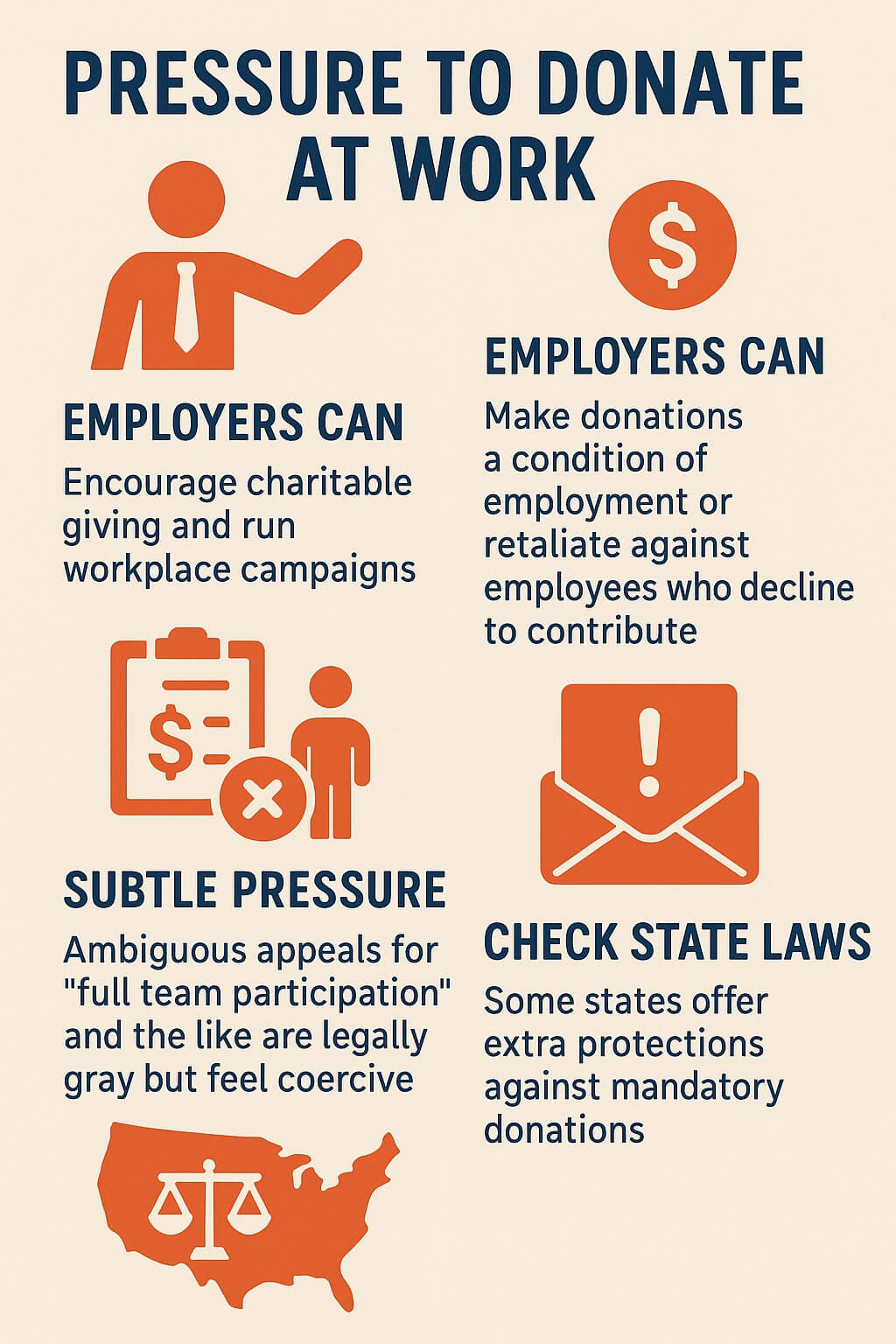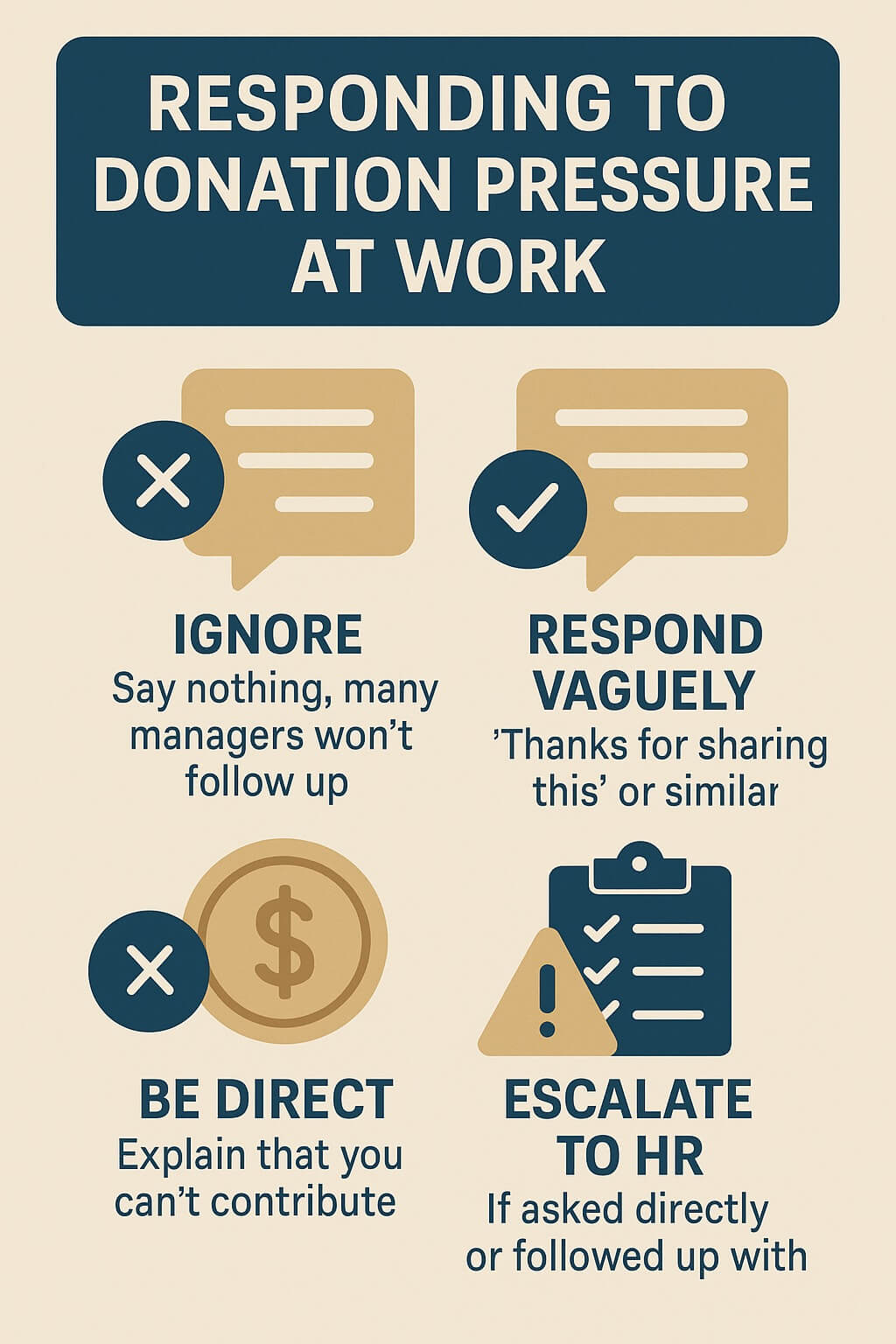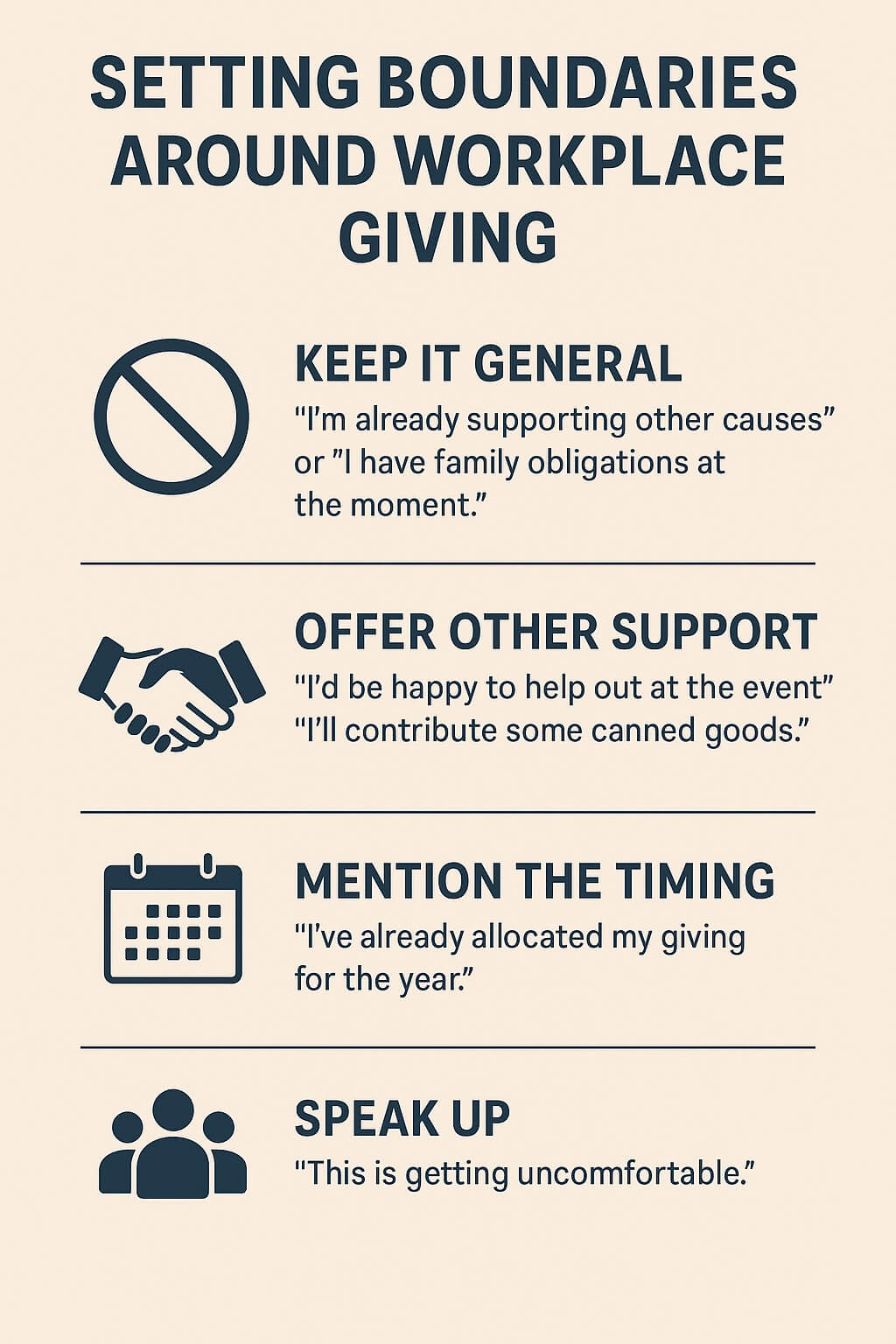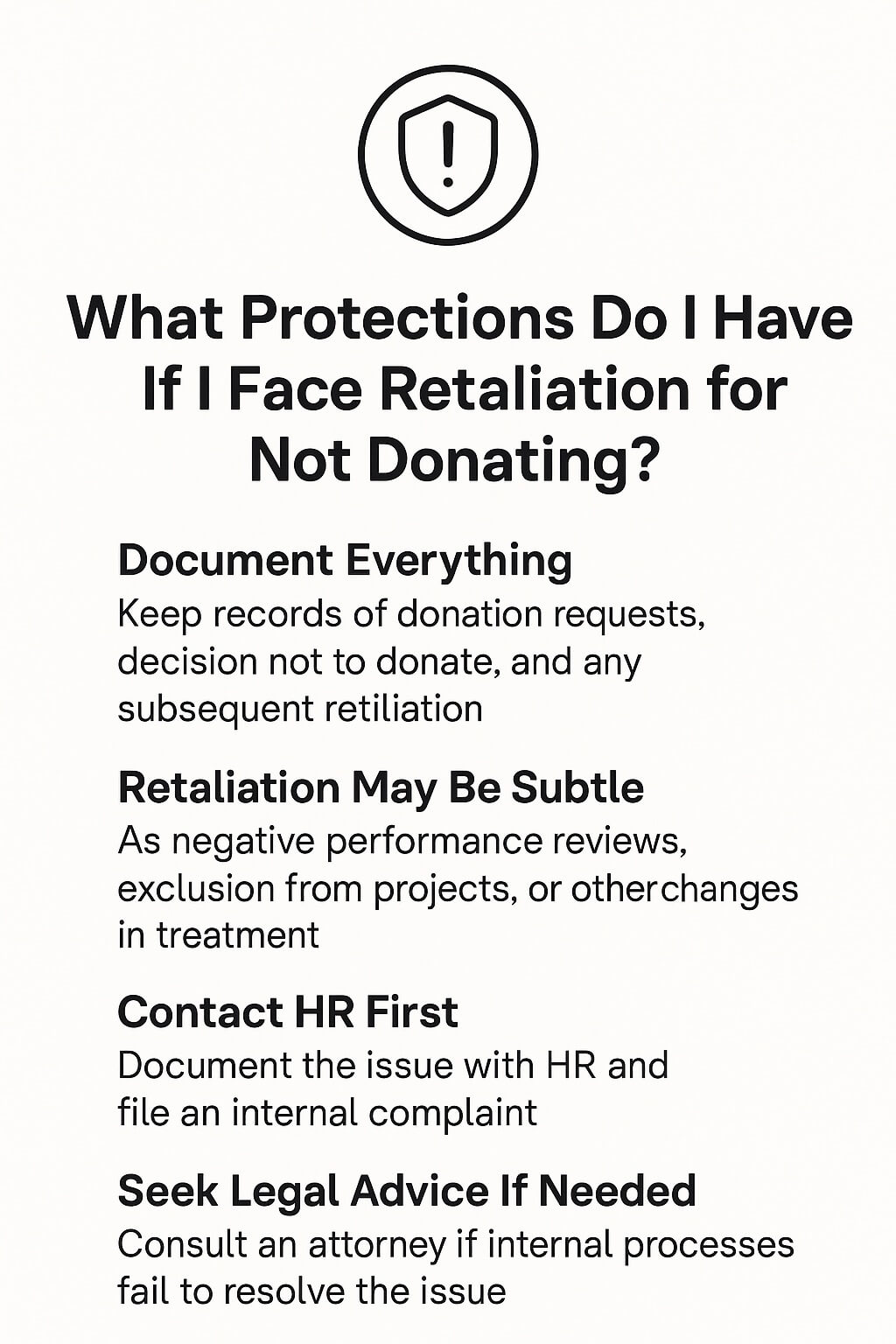Workplace charity drives can put employees in an uncomfortable position. Your company announces a fundraiser for a worthy cause, which seems perfectly fine. Then your manager sends a follow-up message making it clear they expect everyone on the team to contribute. Suddenly, what started as a voluntary donation feels more like a mandatory expense with your job hanging in the balance.
This situation happens more often than you might think, and it raises legitimate questions about workplace rights, HR policies, and how to handle pressure from supervisors. Understanding your options can help you navigate these awkward moments without damaging your career or your bank account.
Is it legal for my boss to pressure me into donating?
The short answer is that it depends on how the pressure is applied. In most cases, employers can encourage charitable giving and even run workplace campaigns. What they cannot do is make donations a condition of employment or retaliate against employees who choose not to participate.
Federal law doesn’t specifically address workplace charitable solicitations, but general employment law principles still apply. Your employer cannot fire you, demote you, reduce your hours, or otherwise punish you for declining to donate to a charity drive. That would be considered an illegal adverse employment action.

However, the line gets blurry when it comes to subtle pressure. If your manager sends an email saying they want full team participation, that’s not technically illegal, even though it creates an uncomfortable environment. The pressure becomes problematic if it crosses into threats, whether explicit or implied, about job consequences.
Some states have additional protections. A few jurisdictions specifically prohibit employers from requiring charitable contributions as a condition of employment. Check your state’s labor laws to see if you have extra protections beyond federal standards.
The reality is that most workplace charity pressure exists in a gray area where it’s not quite illegal but definitely feels wrong. Employers know they can’t force donations, but they also know that many employees will give in to social pressure rather than risk appearing ungenerous or uncooperative.
What do company HR policies usually say about this?
Many large corporations have policies addressing charitable solicitations in the workplace. These policies typically emphasize that all donations must be voluntary and that employees should not feel pressured to contribute. The problem is that policies don’t always translate into practice at the team level.
A well-written policy will state clearly that participation in charity drives is entirely optional, that employees can give any amount or nothing at all, and that donation decisions will not affect performance reviews or advancement opportunities. Some companies go further and specify that managers should not track individual donations or push for full team participation.
Unfortunately, even when these policies exist, individual managers sometimes ignore them. They might genuinely believe they’re doing good by pushing for maximum participation, or they might be responding to pressure from their own supervisors to show strong team engagement. Either way, the disconnect between corporate policy and manager behavior creates problems for employees.
Some companies try to address this by making donations anonymous or by allowing employees to opt in through payroll deduction without their manager knowing the details. These systems work better than campaigns where managers can see exactly who donated and who didn’t.
If you’re facing pressure to donate, your first step should be checking whether your company has a written policy about charitable giving. This information is usually in the employee handbook or available through your HR department. Knowing what the official policy says gives you solid ground to stand on if you need to push back.
How should I respond to my manager’s email about donations?
You have several options depending on your comfort level with confrontation and your relationship with your manager. The simplest approach is to ignore the email and say nothing. Many employees who face this pressure simply don’t respond and don’t donate, and nothing happens to them. Managers who push for donations often send out these emails but don’t actually follow up with individuals.
If you want to acknowledge the message without committing, you can respond vaguely with something like “Thanks for sharing this” or “I appreciate you forwarding this information.” This shows you received the message without indicating whether you plan to donate.
For those who want to be more direct, you can explain that you already support other charities or that your current financial situation doesn’t allow for additional donations. Most reasonable managers will accept this explanation without pushing further. You’re not obligated to provide details about your finances, but offering a brief reason often deflects further pressure.

If your manager explicitly asks whether you’ve donated or follows up individually, that’s when you have stronger grounds to escalate to HR. Direct questions about your participation cross the line from general encouragement to individual pressure, which violates the spirit of voluntary giving.
Some employees choose to donate the minimum amount just to avoid conflict. This is a personal decision, and there’s no shame in taking this route if it preserves your peace of mind and workplace relationships. However, giving in to pressure when you don’t want to can breed resentment and sets a precedent that you’ll comply with similar requests in the future.
Will my boss actually know if I don’t donate?
This depends entirely on how your company structures its charity campaigns. In some systems, donations are completely anonymous and managers only see aggregate team totals. In others, managers have access to reports showing which employees participated, sometimes including donation amounts.
Many workplace giving campaigns use pledge systems where employees fill out forms or submit donations through company portals. These systems often track individual participation, especially if the company is matching employee donations. When matching is involved, there needs to be some record of who donated for accounting purposes.
If your manager states they want to track team participation rates, it’s reasonable to assume they have access to individual donation information or can request it from whoever is running the campaign. The fact that they mentioned “100% participation” strongly suggests they’ll be checking who contributed.
Some companies try to balance manager engagement with employee privacy by showing managers participation rates without names. For example, a report might say “8 out of 12 team members have participated” without identifying which eight. This allows managers to encourage giving without singling out individuals.
If you’re concerned about privacy, you could reach out to whoever is coordinating the charity drive to ask about their reporting practices. Understanding what information is shared with managers helps you make an informed decision about how to proceed.
What happens if I contact HR about this?
HR’s response will depend on several factors including your company’s policies, how the pressure was communicated, and the corporate culture around charitable giving. In the best case scenario, HR will remind managers that donations must be voluntary and will address your specific situation discreetly.
Most HR departments take these complaints seriously because they understand the legal risks of allowing managers to pressure employees for money. Even if no law is being broken, the appearance of coercion can create liability and morale problems. HR will likely review what your manager said and determine whether it crosses any policy lines.
When you contact HR, frame your concern around company policy rather than personal grievances. Explain that you received a message that seemed to pressure team members into donating and that you’re concerned this conflicts with the voluntary nature of charitable giving. Stick to facts about what was said rather than assumptions about your manager’s motives.
HR may speak with your manager to clarify that donation pressure is inappropriate, or they might send out a company-wide reminder that participation is optional. In some cases, they might determine that your manager’s message was within acceptable bounds of encouraging charity participation, even if it made you uncomfortable.
One legitimate concern about contacting HR is whether it will damage your relationship with your manager or mark you as a complainer. This is a real risk, though it shouldn’t be. The best HR departments protect employees who raise concerns about policy violations, but not all workplaces operate this way. You’ll need to weigh the discomfort of the current situation against the potential fallout from escalating it.
If you decide to contact HR, document everything first. Save the emails about the charity drive, note any verbal conversations, and write down dates and details. This documentation protects you if the situation escalates or if you face any negative consequences for not donating.
Are there situations where declining to donate could actually hurt my career?
In a logical, fair workplace, your decision not to donate to a charity drive should have absolutely no impact on your career. In reality, workplaces are social environments where perception matters, and some managers do hold grudges or form opinions based on who they perceive as team players.
The risk is higher in smaller teams where relationships are more personal and where your manager has significant discretion over assignments, raises, and promotions. If your manager is deeply invested in the charity or feels personally judged by their team’s participation rate, they might unconsciously favor employees who donated when making decisions later.
This doesn’t mean you should give in to pressure, but it’s worth considering the dynamics of your specific workplace. If your manager is generally reasonable and you have a good working relationship, they’re unlikely to hold a grudge over a charitable donation. If your manager is petty or vindictive in other areas, this might be one more thing they add to their mental list.
Some companies tie charitable giving to their corporate values or leadership competencies. In these environments, visible support for company initiatives including charity drives might be informally expected of employees who want to advance. This is more common in executive and management roles than in individual contributor positions.
If you’re truly concerned about career impact, you could make a token minimum donation while also setting boundaries in other ways. For example, you might donate once but decline to participate in future drives, or you might donate but also privately speak with HR about the pressure you felt.
The best protection against career retaliation is documentation. If you decline to donate and then suddenly receive negative performance feedback or are passed over for opportunities you would normally receive, that pattern could support a claim of retaliation, especially if other employees who donated were treated differently.
How can I set boundaries around workplace giving without seeming selfish?
The key is remembering that you don’t owe anyone an explanation for your personal financial decisions. How you spend your money is private, and declining to participate in a workplace charity drive doesn’t make you selfish or uncaring. Many generous people choose to give in ways that aren’t visible to their coworkers.
If you feel the need to explain, keep it brief and general. You might say you already support other causes, you have family obligations that limit your giving capacity right now, or you prefer to direct your charitable dollars differently. These explanations are true for most people and don’t invite follow-up questions.

Another approach is to offer non-monetary support if the charity drive includes other ways to participate. Some workplace campaigns include volunteer opportunities, donation drives for goods, or awareness-building activities. Participating in these alternative ways shows engagement without opening your wallet.
You can also frame your response around timing rather than an absolute no. Saying something like “I’ve already allocated my charitable giving for this year” acknowledges the request while making clear you won’t be participating. This phrasing suggests you do give to charity, just not this particular campaign.
Remember that lots of your coworkers are probably in the same boat, feeling pressured but not wanting to donate. You might not be alone in your discomfort, even if everyone else seems to be going along with it. Sometimes speaking up helps other people feel comfortable doing the same.
Setting boundaries now also helps in the future. If you establish that you don’t participate in every workplace giving campaign, it becomes your known position rather than something new to navigate each time. Consistency makes boundary-setting easier over time.
What if this keeps happening with different charities?
Frequent workplace charity drives can add up to significant amounts of money over time. If your company runs multiple campaigns throughout the year and your manager pressures participation in each one, the financial burden becomes substantial, especially for employees who are managing tight budgets or paying off debt.
When charity pressure becomes a pattern, it’s worth addressing more systematically. You might speak with HR about the frequency of campaigns and the pressure employees feel to participate. If multiple employees share this concern, HR is more likely to take action to adjust how campaigns are run or how managers are coached about them.
Some companies have gotten carried away with charitable solicitations, essentially treating employee giving as part of the corporate social responsibility program without considering the burden on workers. Employees shouldn’t feel like their paycheck is being indirectly taxed for corporate charitable goals.
You’re also within your rights to simply stop participating. After the first time you decline, subsequent declines become easier. Your manager and coworkers will come to understand that workplace charity drives aren’t your thing, and most will stop expecting your participation.
If the pressure crosses into harassment territory, with your manager repeatedly asking about donations or making negative comments about non-participants, that’s a more serious HR issue. Persistent pressure that creates a hostile or uncomfortable work environment could violate workplace harassment policies, even if no law is technically being broken.
For chronic situations, consider whether this pattern reflects broader cultural issues at your workplace. Companies that regularly pressure employees about money, whether for charities, gift funds for managers, or social events, might not respect employee boundaries in other areas either. This could factor into longer-term career decisions.
Should I donate just to keep the peace?
Only you can answer this question based on your financial situation and workplace dynamics. There’s no universally right answer. Some people find that donating a small amount eliminates stress and social awkwardness, and that peace of mind is worth more than the money spent.
Before you donate out of pressure, take an honest look at your finances. If you’re carrying debt, living paycheck to paycheck, or saving for important goals, that money might genuinely be better used elsewhere. There’s no virtue in giving away money you can’t afford to give just to please your boss.
Consider also what giving in to pressure teaches your manager about you. If you comply with this request because of implied pressure, you’ve signaled that this tactic works on you. Your manager might use similar approaches in the future for other requests, whether charitable or otherwise.
On the other hand, sometimes picking your battles is the wiser choice. If declining to donate this one time would create significant workplace friction and you can afford a minimal contribution without hardship, making that donation might be the path of least resistance. There’s no shame in making practical decisions about workplace relationships.
Whatever you decide, make peace with your choice and don’t let guilt consume you. If you donate, do so knowing you made a decision that worked for your situation. If you don’t donate, recognize that you have every right to manage your money as you see fit and your employer has no legitimate claim to it.
What protections do I have if I face retaliation for not donating?
If you experience negative consequences at work after declining to donate to a charity drive, you may have legal recourse depending on what happens and how it’s connected to your donation decision. Retaliation for refusing to make a charitable contribution could violate employment laws or company policies.
Document everything if you suspect retaliation. Keep records of the charity pressure, your decision not to donate, and any subsequent changes in how you’re treated. This includes performance feedback, assignment changes, exclusion from opportunities, or any negative interactions with your manager.
Most retaliation isn’t obvious or direct. Your manager probably won’t say “I’m denying your promotion because you didn’t donate.” Instead, it might show up as suddenly harsher performance feedback, being left out of important projects, or receiving less mentorship and support. These patterns can be harder to prove but are still worth documenting.

Start by addressing the issue through your company’s internal processes. Contact HR or use your company’s ethics hotline if one exists. Many companies take retaliation claims seriously because they create legal liability and damage employee morale. HR should investigate whether your manager’s actions constitute retaliation.
If internal channels don’t resolve the problem, you might consult with an employment attorney to understand your options. While refusing to donate isn’t a protected activity in the same way that reporting discrimination is, other legal theories might apply depending on the specific circumstances.
The strongest protection is creating a clear record that connects your refusal to donate with subsequent negative treatment. If other employees who donated received different treatment in similar situations, that comparison strengthens a potential retaliation claim.
How do other companies handle workplace charity campaigns?
Well-run workplace charity programs maintain clear boundaries between encouraging participation and pressuring employees. The best practices include making donations completely anonymous, using aggregate reporting that doesn’t identify individuals, and training managers specifically not to track or pressure team members.
Some companies use payroll deduction systems where employees can opt in to have small amounts taken from each paycheck. These systems work well because they’re private and spread donations over time, making them less burdensome. Employees can change or cancel their contributions at any time without anyone else knowing.
Other organizations focus on volunteer opportunities rather than financial contributions. Offering paid volunteer hours or organizing team volunteer events allows everyone to participate regardless of their financial situation. This approach builds team cohesion without putting pressure on people’s wallets.
Progressive companies explicitly state in their campaign communications that participation is optional and that employees who choose not to give are equally valued. Some even include language reminding managers not to track individual donations or pressure team members, recognizing that left unaddressed, these issues naturally arise.
The companies that handle this poorly tend to tie charitable giving to performance metrics, create competitions between teams, or make participation part of “culture fit” assessments. These practices pressure employees financially while claiming to promote social good, which creates resentment rather than genuine charitable spirit.
What’s the bottom line on workplace charity pressure?
You have the right to decline participation in workplace charity drives without fear of retaliation or judgment. While your manager might express disappointment or push for team participation, they cannot legitimately hold your refusal against you in any professional capacity.
That said, workplace dynamics are complicated, and doing what’s legally right doesn’t always protect you from social awkwardness or potential relationship damage with supervisors. You’ll need to assess your specific situation, including your manager’s personality, your company’s culture, and your own financial reality.
If you can comfortably afford a small donation and it eliminates workplace tension, there’s no shame in that choice. If you’re financially stretched or simply object to the pressure on principle, standing firm on your decision not to donate is equally valid. Either way, know that how you handle your personal finances is your business alone.
When workplace charity pressure crosses lines into actual coercion or retaliation, HR and legal protections exist to address it. Document what happens, understand your company’s policies, and don’t hesitate to escalate if the situation warrants it. Most of the time, though, these situations resolve themselves once the campaign ends and everyone moves on to other concerns.
The broader issue is about boundaries in the workplace. Employers who respect employee autonomy don’t pressure workers for money, regardless of the worthy cause involved. If your workplace regularly crosses these boundaries, that’s valuable information about your employer’s respect for their employees, and it might factor into bigger career decisions down the road.
